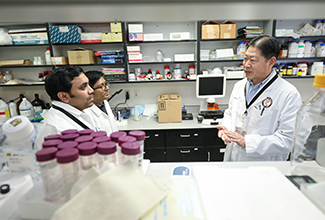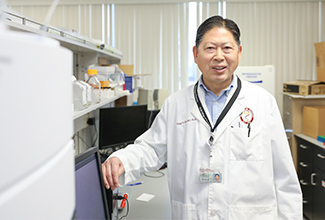
By Mark Henderson
Special to ULM
A team of researchers, including a pharmacologist at the University of Louisiana Monroe, has written a study that points to a possible treatment for a variety of cancers, targeting a mutation in one particular gene.
The paper has been published online and is featured in the February edition of Molecular Cancer Therapeutics, the top journal in the cancer therapeutic field.
The research shows that injecting Ceramide-Rubusoside nanomicelles into mice can correct the mutation in the p53 gene and reverse the cancer process.

PHOTO: University of Louisiana Monroe College of Pharmacy pharmacologist Dr. Yong-Yu Liu, right, working with Ph.D. students Kartik Roy, left, and Sagor Roy, back. ULM Photo Services
Yong-Yu Liu, M.D., Ph.D., a pharmacologist in the ULM College of Pharmacy, said publication of the research reflects 10 years of work and holds promise in the treatment of colon, lung, and ovarian cancers.
“We know cancer is a common disease, and we know that a key issue is gene mutation,” Liu said.
Inside the DNA of human cells are thousands of genes, and scientists have identified triggers for several forms of cancer. “And the No. 1 recent cause of cancer is the mutation of p53,” according to Liu.
Scientists have known for years about the link between the p53 mutation and cancer. Toxins in the environment, among these tobacco smoke and ultraviolet light, damage the gene.
That gene, when healthy, produces a protein that fights off cancer and is known as a tumor suppressor. A mutation changes the way the gene behaves. In some cases, the gene simply stops acting as a suppressor. But in 73 percent of the cases, when p53 mutates, Liu said, the result is a missense mutation in which “the protein function changes. It no longer has its anticancer function. In fact, it begins to promote cancer,” Liu said. And 42 percent of all cancers are linked to the mutation.
Its role in causing ovarian cancer, however, is what concerns Liu and others on the research team the most.
“Younger women are most prone to get ovarian cancer, and that’s why we believe it’s most vital to study it,” He wants to give these victims a chance at a normal life span.
“When you are passionate about what you do, you want to come to a place that lets you focus on that. I love this place.”
Dr. Yong-Yu Liu
On working at ULM
Medical research takes time, however. Progress is measured in years.
Ten years ago, Liu and his fellow researchers were experimenting with a single cell with a p53 mutation inside the laboratory when they discovered the introduction of Ceramide, a metabolite, was able to reverse the mutation.
But the team faced a roadblock in furthering their research.
“Ceramide is not water soluble. It cannot mix with water,” Liu said. “Because of that, we could not get it into the bloodstream.”
For 10 years, the team searched for a solution. Finally, the team determined treating Ceramide with the natural sugar substitute Rubusoside increased the solubility of Ceramide, allowing for the injection of nanomicelles into laboratory mice with the p53 mutation.
The treatment restored the tumor suppression function of the p53 gene in the mice while showing no harm to noncancerous cells.
“That’s major progress,” Liu said.
In addition to the publication of the findings, Liu said, the team has applied for patents with hopes of a pharmaceutical company showing interest in licensing the treatment for field studies.

Co-authors of the study with Liu are Sachin K. Khiste, Kartik R. Roy, Mohammad B. Uddin, Salman B. Hosain and Ronald A. Hill of ULM’s College of Pharmacy; Zhijun Liu of LSU Agricultural Center’s School of Renewable Natural Resources; Xin Gu of LSU’s Health Sciences Center in Shreveport; and Sami Nazzal of the Department of Pharmaceutical Sciences at Texas Tech University Health Science Center, Dallas, Texas.
Liu, who was born in China and attended medical school there, studied three years at the University of Rome, worked in Canada and UCLA before joining ULM’s faculty, said the work is not done.
“We have lots of work to show how our process works. Many won’t believe it,” Liu said.
He credits ULM for providing the atmosphere to do his research. “When you are passionate about what you do, you want to come to a place that lets you focus on that. I love this place.”